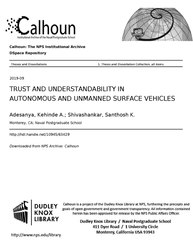File:TRUST AND UNDERSTANDABILITY IN AUTONOMOUS AND UNMANNED SURFACE VEHICLES (IA trustandundersta1094563429).pdf

Original file (1,275 × 1,650 pixels, file size: 1.89 MB, MIME type: application/pdf, 76 pages)
Captions
Captions
Summary[edit]
| TRUST AND UNDERSTANDABILITY IN AUTONOMOUS AND UNMANNED SURFACE VEHICLES
( |
||
|---|---|---|
| Author |
|
|
| Title |
TRUST AND UNDERSTANDABILITY IN AUTONOMOUS AND UNMANNED SURFACE VEHICLES |
|
| Publisher |
Monterey, CA; Naval Postgraduate School |
|
| Description |
Within the human-machine relationship, distrust can arise. The Department of Defense utilizes automation, autonomous systems, and artificial intelligence to reduce cognitive workload and improve mission capabilities; however, adoption rates of autonomous unmanned surface vehicles (USVs) remain low. This thesis asks how human distrust of machines and machine learning relates to adoption rates. First, we identify trust components by building upon a model created by Gari Palmer, Anne Selwyn, and Dan Zwillinger in 2016. Then, we identify components that apply to the military environment that could affect the adoption rate such as smoothing time, policies and regulations, competition, robustness, understandability, subjective norm, human interaction, policy effect, risk to force, time sensitivity, war, time between wars, and catastrophic failure. Through S-curve and smoothing modeling, we find that trust components can be quantified in the human machine relationship as positive or negative trust, and that a relationship exists between understandability and adoption. While autonomous system components generally undergo rigorous testing to verify suitability and operability, human-machine trust is not usually incorporated into design and testing phases. When trust is built into the design and acquisition process, adoption of autonomous USVs is more likely to increase. Researchers can apply our trust model to future autonomous systems to mitigate distrust and human-machine teaming. Subjects: trust; understandability; autonomous; autonomy; transparency; adoption; unmanned; quantitative; USV |
|
| Language | English | |
| Publication date | September 2019 | |
| Current location |
IA Collections: navalpostgraduateschoollibrary; fedlink |
|
| Accession number |
trustandundersta1094563429 |
|
| Source | ||
| Permission (Reusing this file) |
This publication is a work of the U.S. Government as defined in Title 17, United States Code, Section 101. Copyright protection is not available for this work in the United States. | |
Licensing[edit]
| Public domainPublic domainfalsefalse |
This work is in the public domain in the United States because it is a work prepared by an officer or employee of the United States Government as part of that person’s official duties under the terms of Title 17, Chapter 1, Section 105 of the US Code.
Note: This only applies to original works of the Federal Government and not to the work of any individual U.S. state, territory, commonwealth, county, municipality, or any other subdivision. This template also does not apply to postage stamp designs published by the United States Postal Service since 1978. (See § 313.6(C)(1) of Compendium of U.S. Copyright Office Practices). It also does not apply to certain US coins; see The US Mint Terms of Use.
|
 | |
| This file has been identified as being free of known restrictions under copyright law, including all related and neighboring rights. | ||
https://creativecommons.org/publicdomain/mark/1.0/PDMCreative Commons Public Domain Mark 1.0falsefalse
File history
Click on a date/time to view the file as it appeared at that time.
| Date/Time | Thumbnail | Dimensions | User | Comment | |
|---|---|---|---|---|---|
| current | 15:07, 25 July 2020 |  | 1,275 × 1,650, 76 pages (1.89 MB) | Fæ (talk | contribs) | FEDLINK - United States Federal Collection trustandundersta1094563429 (User talk:Fæ/IA books#Fork8) (batch 1993-2020 #31045) |
You cannot overwrite this file.
File usage on Commons
The following page uses this file:
Metadata
This file contains additional information such as Exif metadata which may have been added by the digital camera, scanner, or software program used to create or digitize it. If the file has been modified from its original state, some details such as the timestamp may not fully reflect those of the original file. The timestamp is only as accurate as the clock in the camera, and it may be completely wrong.
| Short title | TRUST AND UNDERSTANDABILITY IN AUTONOMOUS AND UNMANNED SURFACE VEHICLES |
|---|---|
| Image title | |
| Author | Adesanya, Kehinde A., Shivashankar, Santhosh K. |
| Software used | Adesanya, Kehinde A., Shivashankar, Santhosh K. |
| Conversion program | Adobe PDF Library 11.0 |
| Encrypted | no |
| Page size | 612 x 792 pts (letter) |
| Version of PDF format | 1.4 |

